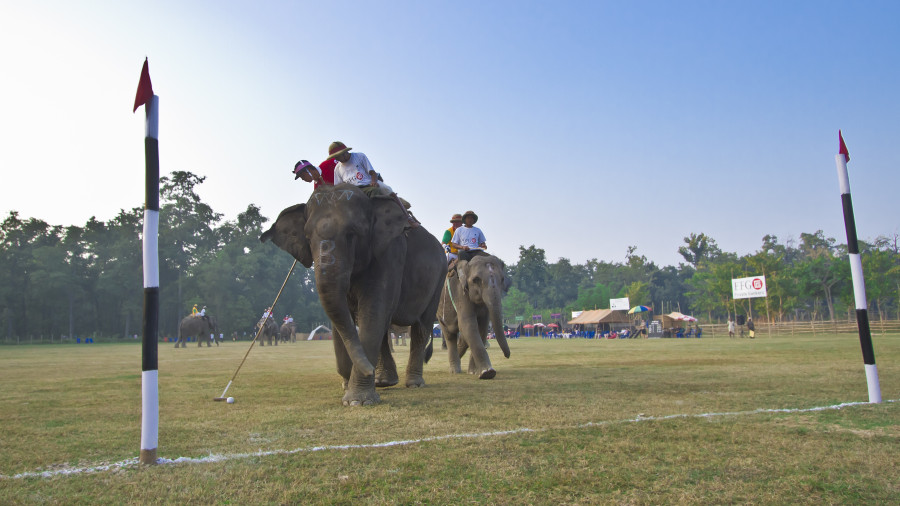Money
Elephant festival returns to Sauraha after three years
Polo, football and racing removed in response to criticism from animal rights activists.
Sangam Prasain
Come December 26, Nepal’s popular wildlife destination Sauraha in the centre-southern Terai, will host the elephant festival after a three-year hiatus.
The organisers, however, have discontinued the popular polo, football and races played by elephants. Elephant polo and football has been halted since the Covid pandemic.
The five-day festival will begin on December 26.
“We have resumed the elephant festival in Chitwan,” said Binayak Shah, president of the Hotel Association Nepal. “But this year, there won’t be elephant polo, football and races.”
Nepal’s most popular but unusual sport, elephant polo used to be played every winter on a grass field in Meghauli, Chitwan. Football played by elephants was introduced later.
“We decided to stop the games in response to animal rights activists' plea to stop the exploitation of the jumbos,” said Shah, who heads the apex body of the private hotels and resorts.
“We, however, have decided to continue the elephant beauty contest and elephant picnic.”
Eco-tourism pioneer Tiger Tops, the annual International Elephant Polo Competition organiser, stopped hosting the event in 2017 to support the movement against animal cruelty.
Elephant polo, a scion of horse polo, was first introduced in Nepal in 1982 after James Manclark started the pachyderm version of the sport with fellow enthusiast Jim Edwards.
The World Elephant Polo Association was formed in the same year at Tiger Tops Jungle Lodge in the then Royal Chitwan National Park in the southwest of Nepal.
The first games were played on a grass airfield in Meghauli, which is located on the edge of the Chitwan National Park.
The game is played by driving elephants using trainers called ‘mahouts’. Initially, a soccer ball was used in the game.
But after elephants started smashing the balls, they were replaced with standard polo balls.
The sticks used in the game are made of bamboo and have a standard polo mallet on the end.
This unusual sport had been attracting hordes of foreigners to the jungle safari destination of Chitwan.
In 2018, Tiger Tops as part of its initiative to support the international movement against animal cruelty, stopped elephant-back safaris. Adventure seekers now follow the jumbos on foot to observe their activities instead of riding on their backs for jungle sightseeing.
Tiger Tops now operates in Nawalparasi as Tiger Tops Tharu Lodge, outside the Chitwan National Park.
In the polo game, nine elephants (four from one side, four from another side, and one referee), were each ridden by a mahout and a player.
Animal rights activists say that the mahout forces the elephant to run after the ball, threatening pain and punishment if the elephant does not respond accordingly.
Elephant polo has been permanently discontinued in Thailand and Sri Lanka following exposure to abusive treatment before and during the event.
Though Tiger Tops, the pioneer stopped the elephant polo, there were other organisers to continue it.
In December 2018 an elephant polo tournament was held in Sauraha, drawing international criticism and exposing the abusive treatment of the elephants.
In 2019 too, it was organised informally, after animal rights organisations like Pro Elephant Network, wrote to Nepal’s then Prime Minister KP Sharma Oli to stop the event.
Dozens of international elephant experts and animal welfare campaigners urged the Nepal government to stop the possible elephant abuse during Visit Nepal 2020, a campaign Nepal launched to attract two million tourists over the year.
The elephant polo and football, however, did not happen in 2020 due to the Covid pandemic.
Basanta Raj Mishra, executive chairman of the Temple Tiger Group, said organising elephant beauty pageants and picnics is the right way to entertain tourists.
But since it requires a huge amount of money to keep elephants, there should be some standards set to host elephant-back rides.
For years, elephants used to carry up to six people through the jungle for 2-3 hours daily. Currently, many seemingly empathetic elephant camps are providing tours with an elephant carrying one or two persons.
“A guideline can be introduced in Nepal to reduce the number of people and the hours elephants work per day,” said Mishra. “This will be a mutual-gains approach between the owners and the elephant.”
The captive elephants need to eat 150-250 kg of food per day.
Owners have to spend Rs75,000-100,000 per month to house, feed and provide medical treatment to them.
“Without tourism, these elephants will have nowhere to go, and no one to pay for their fodder,” said Mishra. “We honour the chain-free initiative of the animal rights activists but at least there should be an alternative to feed them.”
Besides, entrepreneurs have spent billions to build hotels and resorts in Chitwan and Nawalparasi, and their sole objective is wildlife adventure, the jumbo safaris.
There are an estimated 100 captive elephants in Nepal, including those used by the government for jungle patrols. An adult elephant costs up to Rs10 million.
According to Mishra, elephants are being smuggled to India after it became a burden to feed them.
Shah, too, said that there should be minimum standards to allow elephant-back rides.
He said that Patihani currently has become a centre of attraction for many tourists and a large number of resorts including Kasara Resort, Jagatpur Lodge, Tigerland Safari Resort, Jungle Villa Resort, and Safari Adventure Lodge and among others are stationed there.
“But since these resorts don’t offer elephant-back rides, tourists are compelled to visit Sauraha to experience the jungle safari in the elephant back.”




 21.79°C Kathmandu
21.79°C Kathmandu













